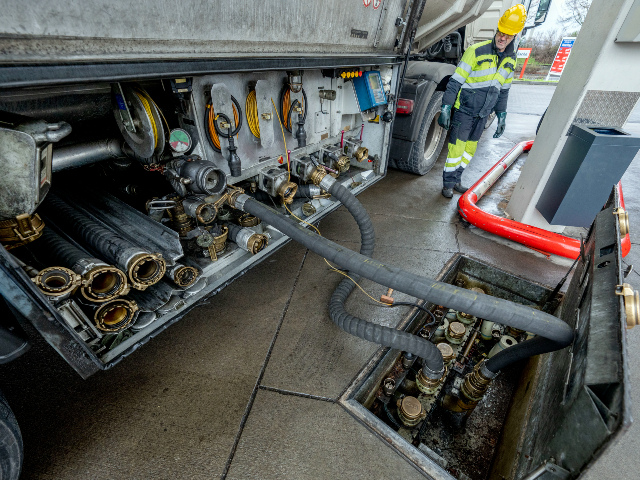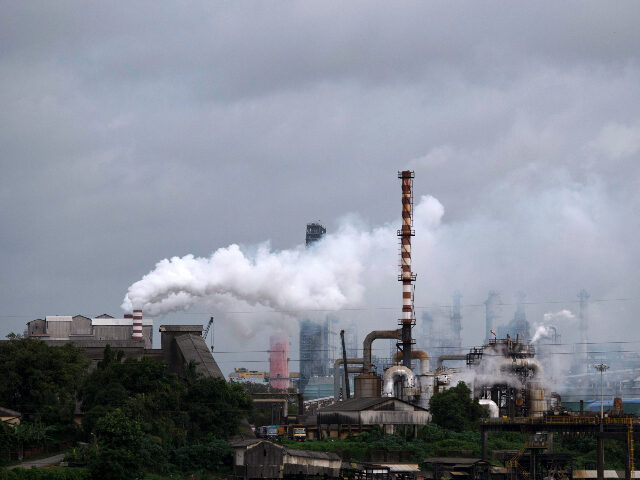India has found a way to profit greatly from Russia’s sanctions situation, purchasing cheap Russian crude and using its tremendous refining capacity to sell America and Europe gasoline and diesel, Bloomberg News revealed on Sunday.
While the crude oil is of Russian origin, purchasing the refined products does not appear to violate sanctions on Russia’s fuel industry imposed in light of the year-old Russian “special operation” to colonize Ukraine. India has refused to boycott Russian oil, coal, or natural gas, citing the government’s need to provide abundant and affordable fuel to its people and the fact that the European countries attempting to lead the charge against Russia are still heavily dependent on its natural gas to heat homes.
According to Bloomberg, India has increased its exports of gasoline and diesel to New York to levels not seen in nearly four years: 89,000 barrels a day.
“Daily low-sulfur diesel flows to Europe were at 172,000 barrels in January, the most since October 2021,” the outlet observed.
America is currently the largest purchaser on earth of Indian refined oil products, purchasing $588 million worth in November.
The crude oil used to produce the product sold was likely Russian, the outlet noted, but neither American nor European officials have appeared concerned about apparently rewarding India for buying Russian oil. European Union rules reportedly identified refined oil products to be from the country where the oil was refined, not from where the crude oil to manufacture the products came from – so the Russian oil is legally deemed “Indian” gasoline and diesel, even if ultimately a different form of the same fuel.
The government of far-left American President Joe Biden, which has spent over $110 billion arming Ukraine against Russia, has attempted to entice India away from propping up the Russian economy with little success. Washington’s most recent overture to New Delhi was the announcement last week that the American government would consider approving a proposal by General Electric to manufacture jet engines on Indian soil. Washington has not, however, limited purchases of Indian oil products given the origin of much of its crude oil.
So far, efforts to drive a wedge between India and Russia have failed. Indian officials have insisted they feel no “moral conflict” in buying Russian oil because their moral obligation is to Indians, not Russians or Ukrainians. India’s External Affairs Minister S. Jaishankar has been particularly acerbic in condemning Europe for condemning India when it continues to depend heavily on Russian natural gas.
Processing Russian oil to sell more expensive refined products to the West appears to be a transitionary policy that the Indian government aspires to one day be replaced by the domestic mass production of crude oil, processed at home and thus completely profiting India. Prime Minister Narendra Modi opened a government event titled “Indian Energy Week” on Monday, inviting international oil companies to consider developing the country’s largely unexploited reserves.
“I ask you to explore all opportunities connected with India’s energy sector. India is the most opportune place for investment today,” he told attendees.
“India has the fourth-largest crude refining capacity in the world, and we are working on increasing refining capacity from 250 MMTPA to 450 MMPTA,” Modi boasted. “The gas pipeline network will expand to 35,000 km in the next four-five years from 22,000 km presently. No-go area for oil and gas exploration has been reduced by 10 lakh square kilometers.”
America, China, and Russia are the only countries to currently possess greater refining capacity than India. To elevate its competitiveness in the market, however, India will have to also become a major producer of crude oil. Of the top three, only China does not produce significant enough quantities of crude oil to respond to its market demand, making it heavily dependent on Russia and the Middle East.

Diesel and other fuel is delivered to a gas station in Frankfurt, Germany, Friday, Jan. 27, 2023. A European ban on imports of diesel fuel and other products made from crude oil in Russian refineries takes effect Feb. 5. The goal is to stop feeding Russia’s war chest, but it’s not so simple. Diesel prices have already jumped since the war started on Feb. 24, and they could rise again. (AP Photo/Michael Probst)
OilPrice.com, which predicted India expanding its crude production significantly, noted last month that any major leaps in crude oil production in the country would require an international effort.
“India has largely untapped oil reserves that it wants to develop rapidly, while oil demand remains high. But it will require a significant amount of FDI [foreign direct investment] to achieve this,” the outlet explained. “If successful, India could reduce its reliance on foreign powers for its oil supply and enhance its energy security.”
According to OilPrice.com India imports about 85 percent of its crude oil.
India’s consumption of Russian crude oil has skyrocketed in the past year. The Indian newspaper the Hindu observed on Monday that India hit record-high Russian crude imports in January.
“From a market share of less than 1% in India’s import basket before the start of the Russia-Ukraine conflict, Russia’s share of India’s imports rose to 1.27 million barrels per day in January, taking a 28% share, according to energy cargo tracker Vortexa,” the Hindu reported. “From a market share of just 0.2% in India’s import basket before the start of the Russia-Ukraine conflict, Russia’s share of India’s imports rose to 28% in January 2023.”
Russia earned the title of India’s largest oil provider in January over Iraq, Saudi Arabia, America, and the United Arab Emirates.
Indian officials have rejected calls to stop buying Russian oil, accusing the West of hypocrisy and insisting it remains neutral in the ongoing invasion of Ukraine.
“We ended the financial year 2022, the purchases of Russian oil were not two percent, it was 0.2 percent,” Indian Oil Minister Hardeep Singh Puri said in November. “Moreover, we still buy a quarter of what Europe buys in one afternoon. So let’s be very clear about what the perspective is.”
Jaishankar, the foreign minister, has condemned Europe for not immediately imposing an embargo on Russia’s energy market on the first day of the Ukrainian “special operation.”
“If it is a matter of principle why didn’t Europe cut on the first day?” he asked in January. “Why didn’t on 25th February, a complete cut off of energy imports from Russia? You can’t say it’s my principle but by the way, I will do it by my timing.”
“Europe imported, in the same period, six times the energy which India did,” Jaishankar insisted.
The foreign minister has also noted in the past the warm relations between New Delhi and Moscow that allowed India to arm its military when the West hesitated to sell India weapons.
“We have, as you know, a substantial inventory of Soviet and Russian-origin weapons, and that inventory actually grew for a variety of reasons – you know, the merits of the weapon systems themselves,” Jaishankar said during a press briefing in October, “but also because for multiple decades, Western countries did not supply weapons to India, and in fact saw a military dictatorship next to us [Pakistan] as the preferred partner.”

COMMENTS
Please let us know if you're having issues with commenting.